Development has been taking place at an unprecedented rate. New roads are being constructed, and existing ones are being updated every once in a while. That said, it is common for drivers to encounter construction sites along roads.
Although construction sites may seem like everyday routines, there is a lot of danger that drivers unknowingly face. Hence, it can be challenging for drivers to navigate these areas.
According to the Centers for Disease Control and Prevention, close to 30,000 people died from construction site accidents from 1982 to 2019. It implies that nearly 800 people die annually, equal to about two per day on construction sites. In brief, drivers must be educated on construction site hazards to save more lives.
Below are a few reasons why road construction sites are dangerous for drivers.
Tough Terrain
Road construction sites have loose gravel, sticky tar, oil, and other substances on the road, which could cause vehicles to skid on the surface. Therefore, unprepared drivers might easily lose control due to bumpy or sticky surfaces.
Similarly, speeding drivers could easily loosen gravel that could crack their windshields or others. The situation is often worsened by severe weather conditions that might reduce visibility and hinder drivers from seeing the terrain and making appropriate decisions.
Speed Limits
For obvious safety reasons, construction zones have reduced speed limits. Unfortunately, impatient motorists driving over the limit pose a danger to themselves and others.
Construction zones have speed limits to enhance worker safety and prevent collisions with on-site machinery. This ensures that if crashes occur, the severity of the fatalities are minimized.
Traffic Patterns
Road construction operators tend to reroute drivers to facilitate construction. As a driver, it is your sole duty to obey and follow the instructions provided by the workers.
However, in some cases, impatient drivers attempt to overlap or overtake other vehicles, which pose severe risks to everyone involved. It could result in a collision with oncoming traffic or construction machinery.
Safety Tips for Drivers in Construction Sites
With all the possible hazards listed above, drivers must familiarize themselves with safety guidelines while driving.
Follow Instructions From Flaggers
Flaggers are often positioned in construction zones to control traffic. Be on the lookout for them and obey any guidelines they give. Though frustrating, it is essential to wait for their signal before proceeding.
Flaggers may use red and green flags to signal stop and go. In other instances, they may use their arms and palms to signify the same. To avoid sudden braking, drive slowly whenever you are approaching a flagger.
Maintain a Reasonable Distance Between Other Cars
There are many unpredictable outcomes in construction sites. It is wise to maintain a reasonable following distance from other vehicles. This provides ample reaction time and space, should anything happen.
Maintaining a distance of about two to three car lengths is a good practice as it prevents rear-end accidents on these sites. Increase your following distance if you are driving behind construction equipment.
Pay Attention
Drivers must be extra keen when driving through construction zones. Avoid distractions like phones and loud music as they may impair your decision-making skills and reaction time. Be on the lookout for workers as they often walk around the site.
Key Takeaways
Overspeeding in construction zones can attract a huge fine. Sustaining injuries from construction accidents could change your life forever, or even end your life altogether.
“If injured on a construction site, you can file a personal injury claim, which will help you cover medical bills and lost wages; however, better safe than sorry” says Felix Gonzalez. Following the outlined steps can reduce your chances of being involved in a crash.
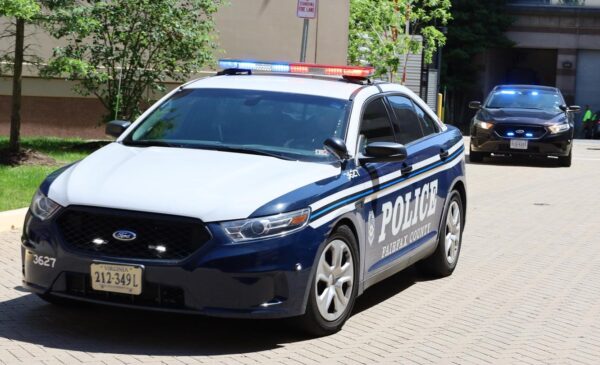
The Fairfax County Police Department has revised how its officers respond to “swatting” after seeing a noticeable uptick in such incidents in recent years.
“Swatting” is a form of harassment involving false 911 calls that are intended to draw a heavy law enforcement response, such as a SWAT team, putting the target in a potentially life-threatening situation.
As of Dec. 6, the FCPD had recorded 12 swatting incidents this year, a decline from the 30 seen in 2021 but still significantly higher than the three reported in 2018 and five in 2019, according to data provided to FFXnow. Incidents have climbed into the double digits since 2020, when there were 11.
“As you can tell they have risen over the years,” said Sgt. Lance Hamilton with the police department’s public affairs bureau. “As a result, we have updated our General Orders regarding the response to ‘Swatting’ events in August of this year.”
Effective Aug. 11, the department’s hostage and barricade procedures now includes a specific subsection on potential swatting incidents:
Officers should factor in, prior to attempting to make contact with any individual at a location where a report of a hostage or barricade incident has been communicated through the Department of Public Safety Communications (DPSC), whether or not the incident constitutes a false “swatting” incident. Officers should consider whether the scene matches the 9-1-1 call description and follow-up with criminal investigations of making a false report to police whenever possible.
Officers should consider “if they have legal authority, what are the potential dangers posed to the community/officers, and is there a need for additional specialized resources from our Operations Support Bureau,” Hamilton said.
“In most cases, this is handled by the department’s de-escalation techniques of using time and distance to slow things down,” Hamilton said. “As you can imagine this is a difficult balance when someone calls 911 regarding an active event.”
The policy change came after community members filed complaints about two separate incidents with the county’s Police Civilian Review Panel, which reviews FCPD investigations into abuse of authority and misconduct allegations.
In one case, police were called to an Annandale townhome at 4 a.m. on March 8, 2020 after a man who claimed to be a neighbor called 911 twice, saying the women who lived there were yelling and fighting. The women said the responsing officers knocked excessively and didn’t identify themselves, leading them to not answer the door right away.
In the other, the FCPD sent a full SWAT team to a home after a 911 caller reported shots being fired “during a likely domestic disturbance,” according to the panel’s 2021 annual report.
While the panel found no misconduct in either case, it expressed surprise at the lack of a follow-up investigation into the 911 caller in the first case and suggested that the FCPD reconsider its policies.
“While the Panel is aware that certain rules concerning 9-1-1 procedures are set at the Commonwealth-wide level, it is our hope that the FCPD and the county can work together to make sure that procedures and laws are in place such that the frequency of such dangerous incidents is greatly minimized,” the annual report said. Read More
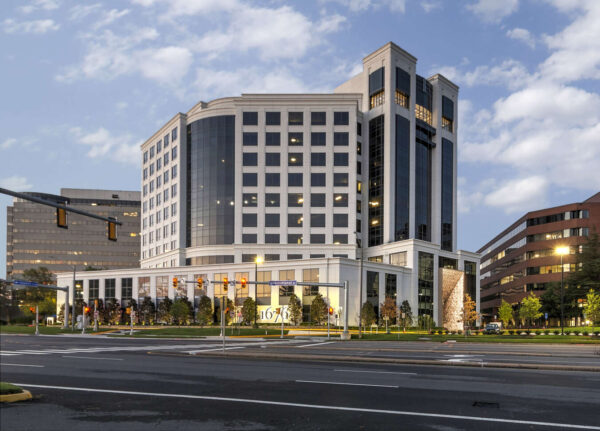
A Richmond-based commercial law firm that dates back to the post-World War II era is inching closer to Tysons Galleria.
Citing a need for more space to accommodate its growth, Hirschler officially moved its Tysons office into a 12,200-square-foot suite at 1676 International Drive just before Thanksgiving, the company announced late last month.
The new space is about 3,000 square feet larger than the firm’s previous office at 8270 Greensboro Drive, according to a spokesperson.
“We have been looking forward to this move since we began exploring this amazing space on International Drive,” said Justine Fitzgerald, managing partner of Hirschler’s Tysons office. “The enthusiasm across our Tysons team from finally inhabiting our new office is already palpable. As we continue to make ourselves at home in the upcoming weeks, we are excited about the impact that the upgraded amenities, technology and collaborative space will have for our clients.”
Hirschler said the move was needed to allow “additional space for sustained growth” of its Northern Virginia and D.C. area operations.
Founded as Hirschler and Fleischer in 1946, the company established its Tysons office in 2016 as part of a merger with the local firm Leach Travell. The office handles business, bankruptcy, real estate, and litigation cases and has now grown to 17 attorneys, the press release said.
The expansion comes as many companies opt to downsize their offices in response to the rise of remote work during the pandemic. In the third quarter of 2022, 80% of Northern Virginia’s leasing activity involved spaces smaller than 10,000 square feet, and vacancies in the region rose to 19.1%, according to an office market report by Avison Young.
In Tysons, demand remains high for “high-end” trophy office space, developers said at a “Future of Tysons” panel earlier this month. The area has added 360,000 of Class-A office space this year, behind only Crystal City in Northern Virginia, Bisnow reported.
An economic study released in March 2021 predicted that Tysons will need at least 1.9 million square feet of new office space over the next 10 years, but it also found that the pipeline for office construction exceeded projected job growth.
Given the uncertainties of the office market and Fairfax County prioritizing affordable housing, developers in the Tysons area and beyond have increasingly focused on converting or replacing commercial properties with residential or mixed-use projects.
The county is also exploring the possibility of allowing vacant commercial spaces to be used as emergency shelter for people experiencing homelessness.
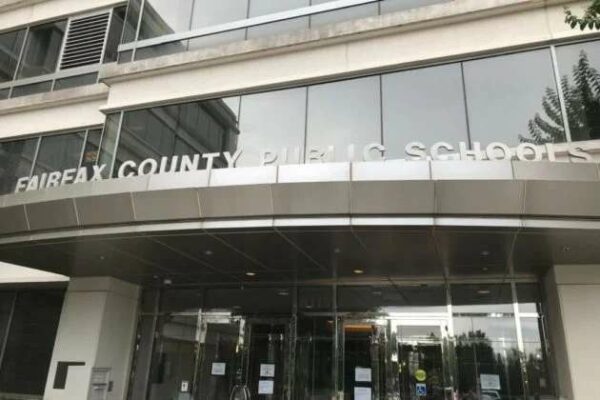
Fairfax County Public Schools could require parental notifications for class materials deemed sexually explicit, but in a deviation from the state, the proposed policy directly addresses concerns about censorship, specifically for LGBTQ-related content.
Introduced at the Fairfax County School Board meeting last night, the policy requires teachers to maintain lists of books, videos, and other instructional materials with “sexually explicit content.” Schools must notify parents at least 30 days before the materials are used and provide alternatives if sought by a parent or student.
“Schools shall defer to parents to determine whether the use of an instructional material with sexually explicit content is appropriate for their child,” the policy states.
As noted by staff, FCPS already has a policy and regulations governing selections of print and electronic materials, including guidance for notifying parents and fulfilling requests for access to the materials or alternatives.
The draft policy generally incorporates a model developed by the Virginia Department of Education, as dictated by Senate Bill 656, which requires school boards to adopt rules specifically for sexually explicit content by Jan. 1, 2023. The bill was signed into law by Gov. Glenn Youngkin on April 6.
However, FCPS has added one clause stating that:
This policy shall not be construed to require or provide for (1) the censoring of books in public elementary and secondary schools, or (2) the designation of instructional material as sexually explicit based solely upon the sexual orientation of the characters contained therein.
The school system told FFXnow it has no comment on the proposal “at this stage,” but the clause seems intended to quell fears that the new requirements could be used to limit access to materials that feature or deal with issues related to LGBTQ people.
Unveiled in early August, the VDOE model policy defines “sexually explicit content” in accordance with the state code:
(i) any description of or (ii) any picture, photograph, drawing, motion picture film, digital image or similar visual representation depicting sexual bestiality, a lewd exhibition of nudity, as nudity is defined in § 18.2-390, sexual excitement, sexual conduct or sadomasochistic abuse, as also defined in § 18.2-390, coprophilia, urophilia, or fetishism.
Virginia Code section 18.2-390 includes “homosexuality” in its definition of sexual conduct, raising concerns that LGBTQ people will be treated as inherently sexual and not suitable for students. The 1,750 public comments submitted on the policy also included praise for it as a step forward for “parental rights.”
The Pride Liberation Project, a student-led advocacy group that started in Fairfax County, was among the critics of the state-proposed policy, but the language added by FCPS has eased its concerns.
“We are grateful to see FCPS clarify that our existence is not sexually explicit,” the group told FFXnow. “Nothing about our existence as Queer students is inherently sexual, but SB 656 threatens to mislabel our community. We hope other school districts follow FCPS’ lead and protect the limited Queer representation in our classrooms from censorship attacks.”
Still, the proposed FCPS policy doesn’t go as far as ones adopted by neighboring districts in warding off potential attacks on LGBTQ materials.
Loudoun County’s school board approved a policy on Wednesday (Nov. 30) that protects materials based on the gender identity of characters, as well as sexual orientation. A policy that went before the Arlington school board last night removes references to section 18.2-390 from its definition of “sexually explicit content.”
FCPS faced questions about material selection last year, when parents complained that there was graphic sexual content in the novel “Lawn Boy” by Jonathan Evison and Maia Kobabe’s memoir “Gender Queer,” which both have LGBTQ protagonists.
Initially pulled from library shelves, the books were restored after review committees determined the claims were unfounded and that their literary merits justified making them accessible to students.
A decade-old fight over Toni Morrison’s classic “Beloved” also became a talking point in Youngkin’s 2021 campaign to become governor. Legislation inspired by that attempted book ban got vetoed in 2016 but served as a precursor for the new state law.
FCPS Pride, an LGBTQ advocacy group for employees, expressed concern that teachers will “self-censor” material out of fear of complaints or harassment.
“No good can come from reducing our curriculum to a few books that make absolutely nobody uncomfortable,” FCPS Pride said in a statement. “Our hope is that, after enacting this policy, FCPS will take legal action on behalf of the right of all students to an education that includes and welcomes them.”

(Updated at 5:30 p.m.) The Virginia Department of Education has no clear timeline for when its new policies on the treatment of transgender students will take effect, leaving Fairfax County Public Schools and other local school districts waiting to see if the state makes any changes in response to vocal opposition to the proposal.
It has now been over a month since the state closed its public comment period for the draft “model” policies, which would require schools to identify students based on their sex assigned at birth and prohibit discipline for deadnaming or misgendering a student even if they get their official school records changed.
“The model policies document has not been finalized. The department is still in the process of reviewing public comment,” VDOE communications director Charles Pyle told FFXnow.
The department received more than 71,000 comments on the policies — some supportive, some critical — while the forum was open from Sept. 26 to Oct. 26.
The policies could’ve taken effect as soon as the comment period ended, but the VDOE said last month that the implementation would be delayed by 30 days under a state code provision that requires a delay if a guidance document might contradict state law.
Opponents of the proposed policies have argued that they would violate the Virginia Human Rights Act, which prohibits discrimination based on gender identity. A section on student participation in athletics also goes against the state law that directed VDOE to create the model policies, which explicitly excluded sports from consideration.
Though the additional 30-day deadline has now passed, Pyle says VDOE has no sense of when its public comments review might finish, citing the volume of comments. The department’s staff can make revisions to the draft guidelines, which must be approved by the state superintendent.
“We have more than 71,000 comments to sort through and the department is exploring options for completing the review,” Pyle said in a statement. “Even after the comments are reviewed, the department will take the time necessary to identify and make any edits identified and warranted by the review.”
The Fairfax County School Board has indicated it won’t adopt the model policies, which contradict its existing policies supporting LGBT students. The Board of Supervisors issued a formal statement opposing them, arguing that they would defy legal precedent and harm transgender and other gender-nonconforming students.
Gov. Glenn Youngkin, who has championed the policies as “protecting parents’ fundamental rights to make decisions for their children,” will be in Fairfax County tomorrow to celebrate last week’s opening of the extended I-66 Express Lanes.
According to a media advisory, Board of Supervisors Chairman Jeff McKay will also attend the ribbon-cutting ceremony in Fairfax Corner, but no policy discussions are expected between the Democratic chair and Republican governor.
“We are guessing the Governor is already well aware of Chairman McKay’s on-the-record staunch opposition to the proposed change in model policies and its impact on Fairfax County families,” McKay’s office said.
After the ribbon-cutting, Youngkin is scheduled to appear in Arlington for an unspecified economic development announcement.
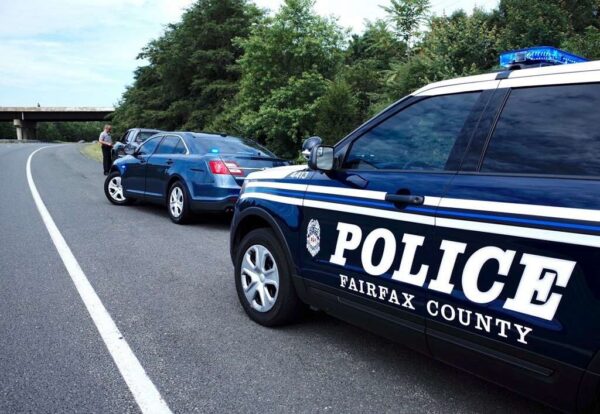
A change in Virginia law will allow police to once again pull over vehicles with excessively loud exhaust systems, starting tomorrow (Friday).
At a Fairfax County Board of Supervisors meeting on Tuesday (June 28), officials said the change was much needed, citing noisy cars as one of the top complaints they receive from constituents.
“This is a very annoying issue to a high percentage of my district’s residents,” Mount Vernon District Supervisor Dan Storck said. “I probably hear about this more than anything else.”
Earlier this year, the Virginia General Assembly passed legislation authorizing police to pull over vehicles and issue violations for loud exhaust systems.
Virginia eased rules on exhaust noise levels after the General Assembly passed legislation sponsored by local lawmaker Del. Patrick Hope (D-47) in 2020. Hope and other advocates argued at the time that police were disproportionately pulling over drivers of color for minor infractions, like broken tail lights, tinted windows, and loud exhaust systems.
That law went into effect in March 2021.
However, the change seemed to lead to a rise in noise complaints related to loud exhaust systems in Fairfax County and neighboring jurisdictions.
So, a new bill was created, passed, and signed into law by the governor this year that specifically made exhaust systems “not in good working order and in constant operation to prevent excessive or unusual levels of noise” a primary offense, meaning police can now pull over drivers specifically for that.
Braddock District Supervisor Walkinshaw and Springfield District Supervisor Herrity said they often hear from residents about loud vehicle exhausts. Hunter Mill District Supervisor Walter Alcorn said expensive, new exhaust systems with the express purpose of making noise are popular among some in his district.
Even Hope, the sponsor of the original bill, admitted to FFXnow that the 2020 bill had “unintendend consequences,” though he did vote against this session’s legislation.
“This [legislation] was in response to the unintended consequence in the 2021 law of some motorists taking advantage of the law change and installing obnoxiously loud exhaust systems on their vehicles, disturbing families and neighbors,” he wrote. “I heard many complaints from constituents that supported the intent of the law but the unintended consequence was a disturbance of the peace.” Read More
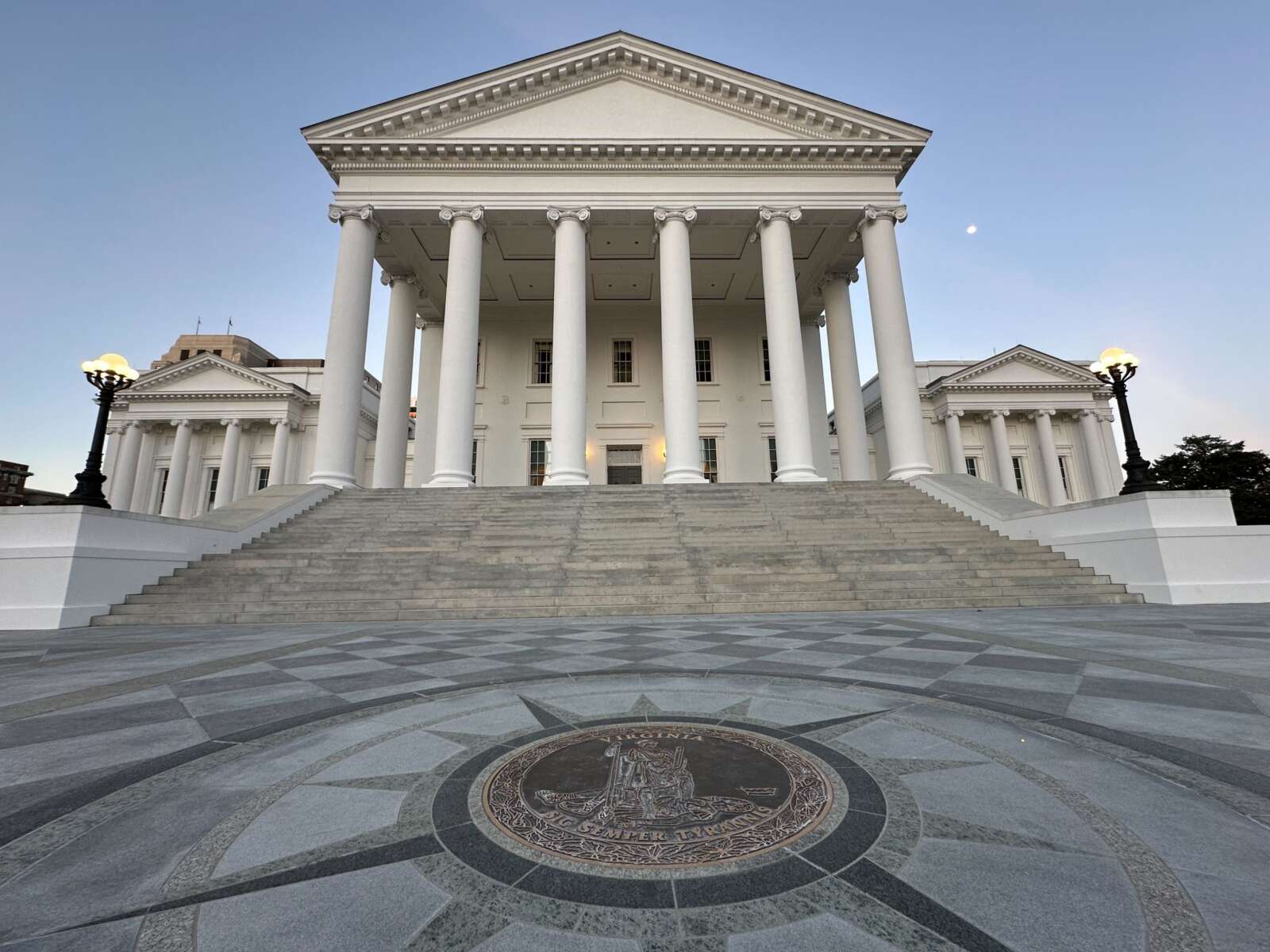
A slew of new laws are taking effect in Virginia tomorrow (July 1), including a ban on police ticket quotas, a requirement for licenses to deliver alcohol, and a new allowance for hunting on Sundays.
The 2022 General Assembly session finally wrapped this month with the approval of a new budget. All in all, about 800 laws were passed by the legislative body and signed into law by Gov. Glenn Youngkin this year, including some from local lawmakers.
A number of those new laws are going into effect tomorrow, July 1.
Here are eight that could impact county residents:
License to deliver alcoholic beverages
The identical bills HB 426 and SB 254 both create a new license for deliveries of alcoholic beverages purchased by consumers. The new law extends the pandemic-era “cocktail to-go” policy while addressing several safety issues.
Businesses will now have to obtain a third-party license, costing between $2,500 and $7,500 depending on company size. The license requires delivery employees to take an online course on age verification, food requirements and responsible drinking.
HB 426 was sponsored by Del. David Bulova (D-37), who represents Fairfax City and parts of Fairfax County.
School principals must report misdemeanors
HB 4 and SB 36 require school principals to report most misdemeanors to law enforcement, including certain kinds of assault, battery, threats made to school officials, stalking, and alcohol and drug use. Before, principals only had to report acts that constitute a felony offense.
Both bills were introduced by Republicans and were a legislative priority of Youngkin, but did have some bipartisan support, including Del. Ken Plum (D-36), Del Mark Sickles (D-43), Sen. Jennifer Boysko (D-33), and Sen. Adam Ebbin (D-30).
No more police arrest or ticket quotas
HB 750 bans police departments and sheriff’s offices from imposing formal or informal arrest or ticket quotas. This particularly affects the issuing of traffic violations, which have long been unpopular with both police and drivers. In some jurisdictions, quotas have been used as a barometer for job performance.
The bill received unanimous support in both the House of Delegates and the state Senate. Read More
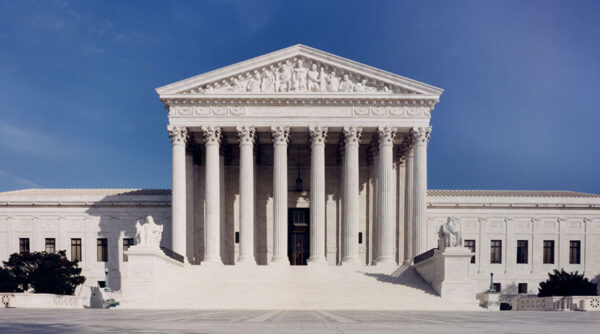
(Updated at 7:30 p.m.) The U.S. Supreme Court overturned Roe v. Wade today (Friday) in a landmark decision that will effectively ban abortion in more than a dozen states.
Abortion remains legal in Virginia, which doesn’t have so-called “trigger laws” that would go into effect with the court’s ruling.
However, shortly after the news broke this morning, Gov. Glenn Youngkin (R) told The Washington Post that he will seek to ban most abortions after 15 weeks of pregnancy.
Youngkin put out a statement in response to the decision:
The Supreme Court of the United States has rightfully returned power to the people and their elected representatives in the states. I’m proud to be a pro-life Governor and plan to take every action I can to protect life. The truth is, Virginians want fewer abortions, not more abortions. We can build a bipartisan consensus on protecting the life of unborn children, especially when they begin to feel pain in the womb, and importantly supporting mothers and families who choose life. That’s why I’ve asked Senator Siobhan Dunnavant, Senator Steve Newman, Delegate Kathy Byron and Delegate Margaret Ransone to join us in an effort to bring together legislators and advocates from across the Commonwealth on this issue to find areas where we can agree and chart the most successful path forward. I’ve asked them to do the important work needed and be prepared to introduce legislation when the General Assembly returns in January.
The decision will also not immediately impact the legality of abortion in neighboring D.C. and Maryland.
Fairfax County Commonwealth’s Attorney Steve Descano, the county’s top prosecutor, stated that he will never prosecute women for having an abortion, even if the state laws change, a sentiment he previously shared in a New York Times op-ed.
No matter what the law in Virginia says, I will not prosecute a woman for having an abortion, or for being suspected of inducing one. pic.twitter.com/kgDD1KGWPd
— Fairfax County Commonwealth's Attorney Descano (@FairfaxCountyCA) June 24, 2022
Most of Fairfax County’s representatives expressed outrage, describing the ruling as a rollback on human rights and a “dark moment.”
President Joe Biden, who previously said he’d look to shore up abortion rights, is expected to deliver remarks on the decision at 12:30 p.m.
Fairfax County Board of Supervisors Chairman Jeff McKay said in a statement that he’s “deeply concerned about the future of women’s rights and healthcare in our nation” but noted that the Supreme Court ruling won’t immediately affect abortion access in Virginia. Read More
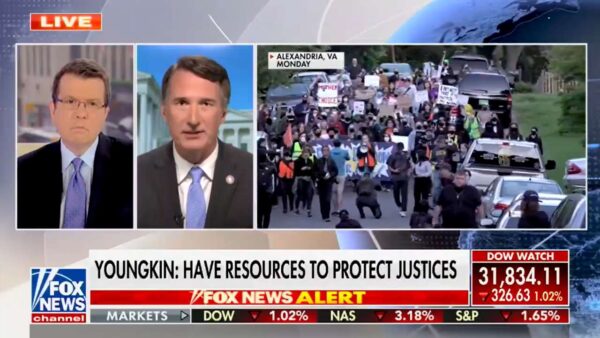
(Updated at 3:45 p.m.) Virginia Gov. Glenn Youngkin has some thoughts on how Fairfax County should handle abortion-related protests outside Supreme Court justices’ homes.
In a letter sent to the Board of Supervisors and County Executive Bryan Hill yesterday (Wednesday), the governor suggested that the Fairfax County Police Department “establish an expanded security perimeter” and limit “unauthorized vehicle and pedestrian access” around the homes of Justices Samuel Alito, Clarence Thomas, and Amy Coney Barrett, who all live in the county.
“This request is based on credible and specific information received about upcoming activities planned at or involving the homes of the Justices in Fairfax County,” Youngkin wrote in the letter, which was posted online by Springfield District Supervisor Pat Herrity. “…Establishing a perimeter will ensure both the safety of the Justices, their neighbors and the demonstrators.”
I hope protesters of every persuasion will respect our laws regarding public expression and prevent required police intervention in the form of warnings or citations. pic.twitter.com/lg873GkP5g
— Supervisor Pat Herrity (@PatHerrity) May 11, 2022
Board of Supervisors Chairman Jeff McKay resoundly rejected Youngkin’s proposal, arguing that it would amount to “a checkpoint that federal courts have held violates the Fourth Amendment.”
He said it would also raise concerns related to the First Amendment’s protections for freedom of speech and assembly, stating that the county’s “well-trained, sophisticated” police department “stands ready as always to take necessary action, if needed, to protect public safety.”
“My focus is on public safety and protecting constitutional rights of our citizens,” McKay said in a tweet sharing his letter to Youngkin. “I know the well-trained FCPD professionals can ensure both.”
Below is a letter I sent to Gov. Youngkin in response to request for a 'security perimeter' around the homes of SCOTUS judges in FFX Co. My focus is on public safety and protecting constitutional rights of our citizens. I know the well-trained FCPD professionals can ensure both. pic.twitter.com/1qW8pSPGYN
— Jeff McKay (@JeffreyCMcKay) May 11, 2022
The exchange came two days after abortion-rights advocates organized by the group ShutDown DC marched to Alito’s house in Fort Hunt in protest of his leaked draft opinion indicating that the Supreme Court intends to overturn Roe v. Wade, the landmark case that has been used to protect access to abortion for nearly 50 years. Read More
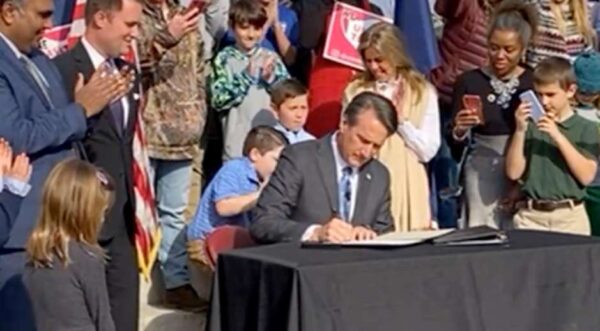
Gov. Glenn Youngkin signed a bill yesterday (Wednesday) making masks optional in schools by March 1.
Fairfax County and other Northern Virginia school systems have continued to require students to wear masks, even after Youngkin issued an executive order that gave parents the choice whether their children wore a mask.
The school board, along with six others, sued the governor, challenging his power to prohibit local mandates. But Senate Bill 739 makes that suit moot, establishing the order as law. All jurisdictions that have mask mandates must make them optional by March 1.
The effort to make masks optional was led by Sen. Chap Petersen (34th District). Petersen said that in the final version of the bill, the governor can reimpose mandatory mitigation measures if necessary.
“COVID-19 has been a tough and stressful time, and our kids have been hit the hardest,” Petersen said in a statement. “We are in a different world than we were two years ago. The vaccine works and is widely available. Universal mask mandates, especially for children who are healthy and vaccinated, is an onerous and outdated measure that will now end on March 1st.”
Fairfax County Public Schools said in a statement that it was reviewing the legislation to determine “what this means for FCPS.” With the bill adding pressure, the school system announced a plan last week to make masks optional once COVID-19 transmission returns to a moderate level in the county.
While cases have been declining in recent weeks, community transmission remains high, as measured by the Centers for Disease Control and Prevention.
When should masks become optional in schools — as soon as possible or when COVID-19 transmission levels are reduced?
Photo via Governor of Virginia/Facebook Live


